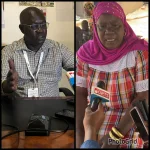Tostan's social mobilizer in Kuntaur, Aja Fatoumatta Jabbie, has praised the Tostan project for its role in ending Female Genital Mutilation (FGM) in the Central River Region (CRR) and promoting girls' education. The project, a collaboration between ChildFund and UNFPA, focuses on protecting children and empowering women.
During a press interview on ChildFund's country-wide tour, Jabbie explained that since Tostan began its work, FGM has not been practiced in the CRR region. She attributed this change to the project's efforts in educating practitioners about the harmful effects of FGM on girls.
Jabbie acknowledged that raising awareness about FGM can be challenging, but Tostan takes a sensitive approach. They inform communities about the negative consequences of the practice, such as fistula, and provide preventive measures. They avoid using coercive methods, recognizing that FGM is a deeply-rooted tradition.
In addition to addressing FGM, Tostan also tackles the impact of early marriage on children's education. Before the project's intervention, child marriage was prevalent in the region. However, Tostan's advocacy efforts in schools and with teachers have significantly reduced its occurrence. They educate communities about harmful practices and promote positive social behavior between children and parents.
Jabbie expressed gratitude to ChildFund for their support and encouraged them to expand the project, believing it has the potential to transform many lives. Edrisa Keita, Tostan Gambia's national coordinator, also acknowledged ChildFund's crucial role in the project's implementation.
ChildFund provides two funding streams to Tostan. The first, seed funds, support organizations in conducting media and social mobilization activities. These efforts aim to empower communities by sharing information about the health implications of gender-based violence, such as FGM, child marriage, and other economic and social issues affecting women and girls in The Gambia.
As part of the project, Tostan engaged with over 500 people at various decentralized levels, including chiefs, Alkalolu, religious leaders, and traditional leaders in the Upper River Region and CRR. They also conducted a three-day training seminar with 40 religious leaders, recognizing their vital role in disseminating information and discussing human rights.
Keita emphasized the importance of engaging religious leaders to ensure they understand Tostan's approach to community well-being and to discuss religion's stance on human rights, particularly those of women and children. He expressed satisfaction with the successful execution of these engagements, made possible through the support of ChildFund and UNFPA within their program's context.
During a press interview on ChildFund's country-wide tour, Jabbie explained that since Tostan began its work, FGM has not been practiced in the CRR region. She attributed this change to the project's efforts in educating practitioners about the harmful effects of FGM on girls.
Jabbie acknowledged that raising awareness about FGM can be challenging, but Tostan takes a sensitive approach. They inform communities about the negative consequences of the practice, such as fistula, and provide preventive measures. They avoid using coercive methods, recognizing that FGM is a deeply-rooted tradition.
In addition to addressing FGM, Tostan also tackles the impact of early marriage on children's education. Before the project's intervention, child marriage was prevalent in the region. However, Tostan's advocacy efforts in schools and with teachers have significantly reduced its occurrence. They educate communities about harmful practices and promote positive social behavior between children and parents.
Jabbie expressed gratitude to ChildFund for their support and encouraged them to expand the project, believing it has the potential to transform many lives. Edrisa Keita, Tostan Gambia's national coordinator, also acknowledged ChildFund's crucial role in the project's implementation.
ChildFund provides two funding streams to Tostan. The first, seed funds, support organizations in conducting media and social mobilization activities. These efforts aim to empower communities by sharing information about the health implications of gender-based violence, such as FGM, child marriage, and other economic and social issues affecting women and girls in The Gambia.
As part of the project, Tostan engaged with over 500 people at various decentralized levels, including chiefs, Alkalolu, religious leaders, and traditional leaders in the Upper River Region and CRR. They also conducted a three-day training seminar with 40 religious leaders, recognizing their vital role in disseminating information and discussing human rights.
Keita emphasized the importance of engaging religious leaders to ensure they understand Tostan's approach to community well-being and to discuss religion's stance on human rights, particularly those of women and children. He expressed satisfaction with the successful execution of these engagements, made possible through the support of ChildFund and UNFPA within their program's context.












